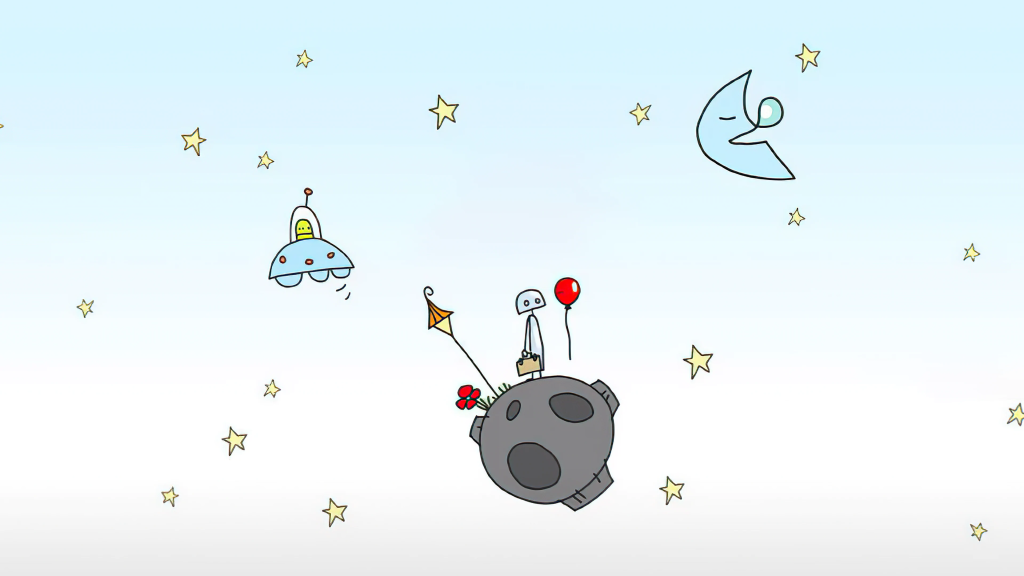
Fasten your seatbelts and settle into your seats. We go on a bizarre journey to an apparently infantile world where you don’t have to kill or battle anyone, only listen and help. It’s time for something altogether new, a game that will teach us some intriguing things about what the terms man and humanity truly imply.
The owners dump a robot named QT3 (cutie) on a tiny asteroid. After many years of waiting, he is discovered by Jeff, a cheery extraterrestrial who is responsible for the survival of the QT3 series of robots. It turns out that these models do not know enough about humans to successfully assist them and will most likely be completely reprogrammed. Jeff, on the other hand, gives QT3 one more opportunity. He gives him a particular mission: to explore many worlds, meet people, and learn everything he can about the core of mankind. At first appearance, HumaNature’s indie game appears to be suitable for children. This is simply an appearance, but the project’s triviality essentially stops with very simple gaming mechanics and graphic style evocative of toddler doodles.

The basic objective is to travel across space, visiting different worlds and resolving problems that beset their populations. We chat to everyone we meet, learn about their wants and requirements, and then assist them achieve them. Sometimes simply giving someone something lovely is enough to lift their spirits; other times, we must work hard to get others to join in and assist us. QT3, being a machine for making people happy, can make any thing we come across out of “dust bunnies.” We may construct over 300 distinct things to which each hero responds uniquely. It’s similar to Scribblenauts, except instead of inputting words, you select objects from a wide array of bubbles. The robot’s and its space vehicle’s look can also be modified at any moment. A robot that resembles a metal lumberjack and flies on the back of a winged Swiss cheese? So why not? QT3 on a gigantic hamburger with a toaster for a head? If we so desire. The gameplay’s simplicity is an excellent technique to keep the player’s attention on the subject. Dialogues with residents are confusing and frequently feature stuff that is plainly aimed towards older audiences. We discover many fascinating values in these dialogues when, for example, they can raise and inquire about ideas such as beauty, love, hatred, tolerance, loneliness, and many more.
All of this is accompanied with slightly disturbing clichéd images – each planet is thematically and racially homogenous. As a result, we explore celestial bodies inhabited just by Asians, Egyptians, and basic African tribes, but we also learn about planets populated solely by townsfolk, monsters, robots, sunbathers, and excrement lovers. Interactions on such planets can startle and leave us pondering for a minute about the intolerance and misunderstanding we face every day, but only when expressed in a child’s language, tossed like coffee on the bench, can they make us think. This is only the beginning of the process of contemplation. The experience progressively transforms from a lesson in humanity for the robot to a journey culminating in deep self-analysis. We may travel between worlds by visiting little asteroids inhabited by smart monks who ask us a series of questions. These few questions are essentially psychological tests that, shockingly, properly characterize the player’s personality qualities. The more exams we complete, the more we will discover about ourselves. We may go over the exams we’ve taken and provide further reasons for why we gave the answers we did. Doctor Therapist, a happy man in a white coat, welcomes us to his sofa on QT3. It compiles all decisions made on planets and asteroids and identifies certain aspects of our personality. It’s frightening how these colorful and enjoyable exams may reveal so much about us. The individuals we meet get close to us and frequently write amusing letters about occurrences on their home planets. It’s especially pleasant when we get a letter from a small girl who acquired a cat from us and speaks about playing with it, or when a stinky monster writes to brag about building a feces-filled mansion.

Doki Doki Universe frequently left me wondering who this game was truly targeted at. It is childish and immature, and it is rather long. It is mechanically founded on didactic foundations. It does not have a Polish equivalent, and not knowing English eliminates almost all of the information. Adults may also become fatigued by the quantity of repeating chores or develop an aversion to psychotests that assess behavior while resting in front of the television. Despite this, the low price and the fact that the purchased game is immediately available on three Sony devices are quite appealing. Doki Doki is also a welcome diversion from the monotony of continually rushing and shooting hundreds of opponents. Nobody wants to hurt anybody here, therefore the amusing robot approaches the guy, embraces him, and asks honestly, “How can I help you?” and “How can I make you happy?”
